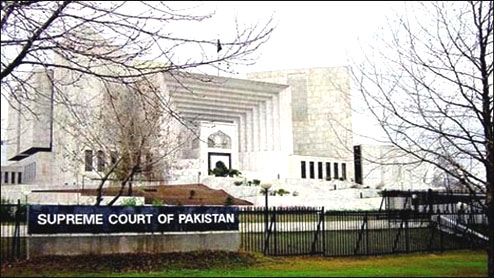 The nine-member bench of the Supreme Court (SC) hearing the memogate case has unanimously ruled the other day that the petitions are maintainable and has set up a three-member judicial commission to investigate the affair and report back in a month.
The nine-member bench of the Supreme Court (SC) hearing the memogate case has unanimously ruled the other day that the petitions are maintainable and has set up a three-member judicial commission to investigate the affair and report back in a month.
The commission will be headed by the Chief Justice (CJ) of the Balochistan High Court Qazi Faez Isa and include the CJs of the Islamabad and Sindh High Courts. The SC bench has also reiterated its order of December 1 directing former ambassador to the US Husain Haqqani not to leave the country without the court’s permission.
It may be recalled that the counsel for Mr Haqqani, Asma Jahangir, had argued before the SC that the petitions were not maintainable on grounds of the issue being a political one, and had cited case law from foreign and Pakistani jurisprudence in support of her arguments, apart from questioning the appropriateness of the issue being agitated at a judicial forum when parliament was already seized of the matter.
She had also questioned the order of December 1 against her client, stressing that he had been ‘condemned’ unheard and this was a violation of Mr Haqqani’s fundamental rights. That order has been questioned also on the grounds of being tantamount to giving relief to the petitioner/s that they had not even asked for. No wonder then that the latest ruling visibly upset Asma Jahangir, who criticised the ruling as being ‘establishment-minded’, having put the civilian government under the military’s command and prioritised national security above fundamental rights.
She was of the view that the order was not in accordance with the rule of law. She characterised the occasion as a dark day for the judiciary, questioning whether the judiciary restored through the lawyers’ movement was a judiciary of the people or the establishment.
Reluctantly accepting the ruling, as is expected of a senior lawyer, she nevertheless reserved the right to file a review petition against the ruling once the detailed order was available. She also cautioned the petitioners, particularly the PML-N, that the court’s order would come back to haunt them in future.As validation of Ms Jahangir’s contention, the parliamentary committee on national security has decided to summon Husain Haqqani, DG ISI General Pasha and the main character in the whole brouhaha, Mansoor Ijaz, to appear before it. We are in therefore for an embarrassing scenario where two of the highest forums of the state, parliament and the judiciary, would be dealing with the same matter at the same time.
On this count, many senior jurists, including Justice (retd) Tariq Mehmood, have added their voices to the criticism of the SC in admitting the petitions for hearing at such a juncture. A possible, bruising outcome could be that the judiciary and parliament rule contradictorily on the issue, sparking a division and perhaps a clash between the two highest state institutions.The independence of the judiciary has been proclaimed repeatedly since its restoration. That is of course a desirable outcome, given the sorry history of supine judgements of the superior judiciary in our past, especially where validation of military coups has consistently been in evidence.
Although CJ Iftikhar Mohammad Chaudhry has repeatedly said there is no question of repeating that bad track record, the doctrine of necessity on which such past validations were based having been buried, the present case does arouse concerns that the court may be giving more weightage to the views of COAS General Kayani and General Pasha, whose affidavits before the SC seem to be at odds with their nominal ‘bosses’, the federal government. In cases of such political and constitutional import, the SC in its own interests must ensure that justice is not only done, but is seen to have been done, without giving critics the slightest opportunity to accuse it of bias, since this would be deleterious for the respect and dignity of the judiciary. – Dailytimes












